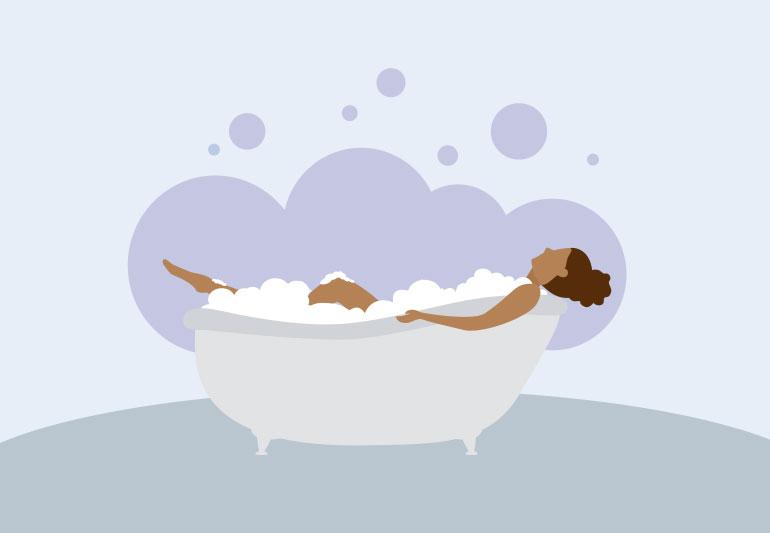When Kortnie Aldous of Holladay, Utah, was in a ski accident last year, she broke her tibia, fibula and ankle. One emergency surgery and five days in the hospital later, occupational therapists began teaching her how to do routine tasks from scratch. They also taught her how to cope with the pain.
"My physical therapy sessions for three months, began with my injured leg submerged in a warm, whirlpool-like bath," Aldous says. The practice soon became her norm at home. "I found that a hot bath decreased my pain and helped my body relax," she says.
She isn't alone.
Multiple studies have addressed the benefits of bathing in warm water – pain relief among them. While doctors frequently recommend heat therapy, such as heating pads, to relieve pain, those methods may not penetrate muscles as deeply as the hydrotherapy method of soaking in hot water. And experts say there are a host of other benefits to baths that many people do not realize.
William Robiner, a professor of medicine at the University of Minnesota's Medical School, says hot water helps relax the muscles surrounding damaged nerves, disks or vertebrae . "When the body's temperature is raised, the dilation of blood vessels increases blood to the muscles in those areas," he says, adding "flowing water in whirlpools and hot tubs can also mimic massage pressure," providing additional relief.
Baths have also been proven to relieve stress. Stress levels reduce as hot water increases body temperature, thereby calming the nervous system, releasing endorphins such as dopamine and serotonin ("happy hormones"), and improving circulation, says Veena Graff, an assistant professor of anesthesiology and critical care at the University of Pennsylvania Perelman School of Medicine.
A bath before bed
Another benefit of bath-taking that Rajkumar Dasgupta, an associate professor of sleep and critical care at the University of Southern California, has observed, is it can help you sleep better.
Feeling tired at work? Ditch the caffeine and take a power nap.
"When people incorporate a warm bath into their bedtime routine, they affect their circadian rhythm by warming up their core body temperature before it cools down naturally in their sleep," he says. He cited a 2019 study that showed people who bathe or shower before bed, fall asleep quicker and stay asleep longer.

Studies have also shown bathing helps with depression.
The other benefits of taking a bath
"There is very good evidence and neuroscience showing the connection between physical warmth and social warmth," says John Bargh, a psychology professor at Yale University. In 2012, Bargh co-authored a study that found that people who bathed frequently felt better about themselves and less lonely."Research shows that heat on the skin opens a pathway in the brain - the same one that antidepressant medication opens up," he says.
Indeed, the social connection provided through warmth is so strong that last year when COVID-19 patients were unable to receive visitors and were often dying alone, doctors filled latex gloves with hot water to provide physically warm "hands of love" for the patients to hold.
In addition to the emotional benefits, hot water may also boost your metabolism, says Sven Hoekstra, a rehabilitation scientist at the Peter Harrison Centre for Disability Sport at Loughborough University who co-authored a 2018 study that showed the upside of hot water immersion.
More: Mila Kunis, Ashton Kutcher don't shower every day. Should you bathe daily?
Hoekstra's findings were not unlike a study his colleagues conducted that showed that taking a hot bath may burn as many calories as taking a 30-minute walk.
More:1 in 4 couples sleep in separate bedrooms. It affects the whole family.
What's more, a 2020 study published in the health journal Heart, collected data from more than 60,000 participants for 30 years to show the more you bathe, the more you lower your risk of dying from heart attack, heart disease or stroke.
Despite the benefits of soaking in hot water, there may be downsides to doing so too often. A 2016 YouGov survey showed a third of Americans take a bath at least a few times a week, with 14% of respondents saying they do so every day – a frequency that may not be healthy for everyone. Bathing too often has been shown to dry out skin and strip away the oils in your skin's outer layers that help preserve moisture.
Still, the many advantages of soaking in the tub at least occasionally are well-proven.
Poet and novelist Sylvia Plath seems to be ahead of her time in writing in 1963: "I am sure there are things that can’t be cured by a good bath, but I can’t think of one."
More:Should you shower with soap and water daily? Doctors say yes
The Rock takes a cold shower every day. Should you? Here's what experts say.









